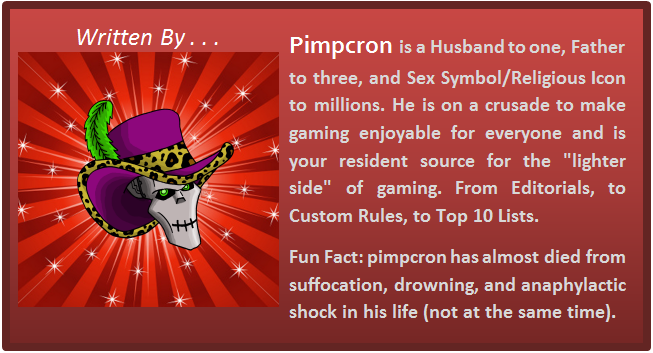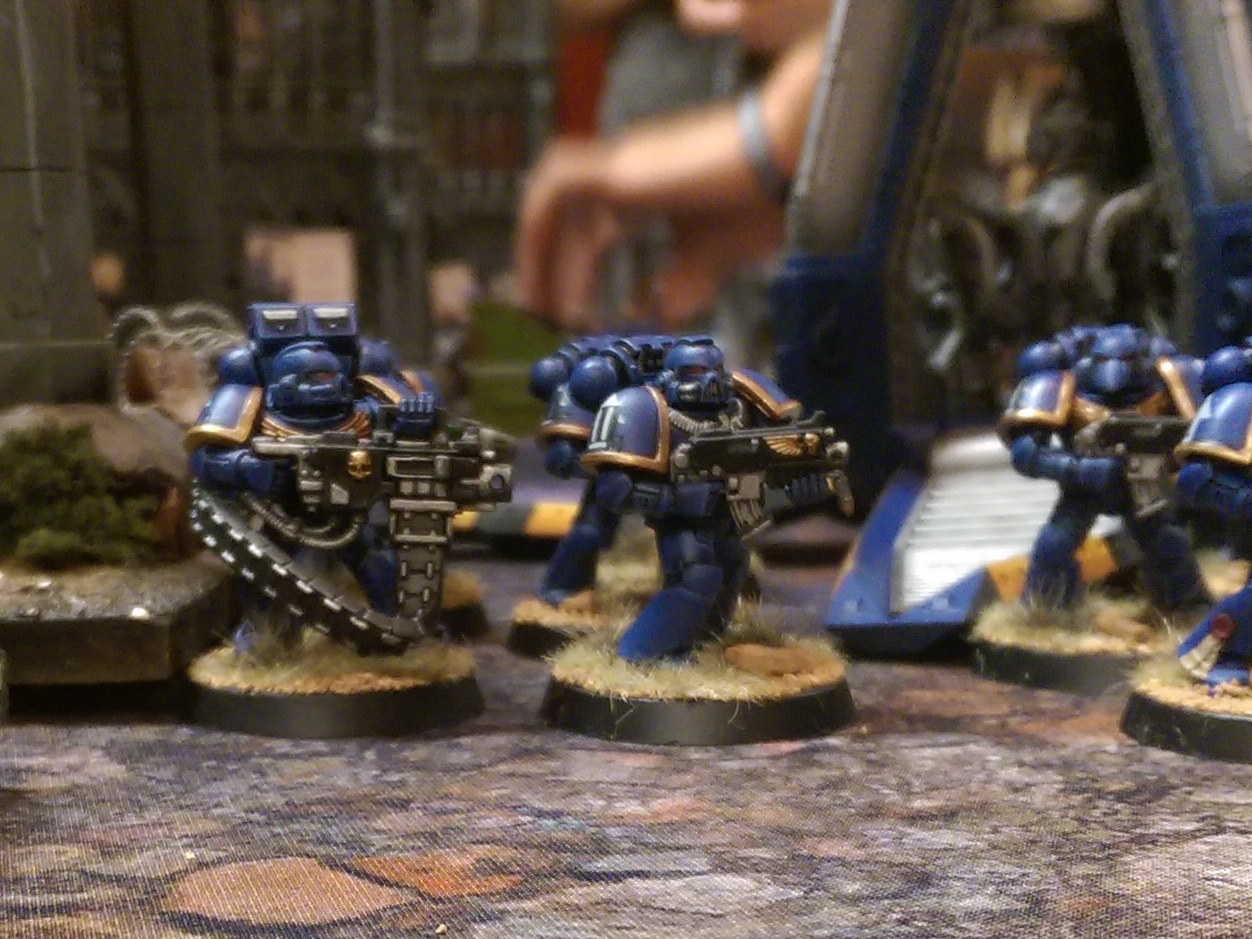40k is Better Than Magic: The Gathering


Pimpcron explains how wargaming is the ultimate pastime.
I’ve zipped up my flame-retardant suit, set the air conditioning really low, left the fridge open, and I’m drinking a Slurpee. Let’s get to the thing that most people in the wargaming field secretly believe: Wargaming is the pinnacle of any gaming experience.
At any given game store, you will find droves and droves of Magic: The Gathering players on Friday Night Magic. But you’ll be lucky to find a handful of wargaming players, and even luckier if they happen to play the same wargame as you. There are many reasons for this I’m sure, but I can’t help but wonder, “why aren’t more of you Magic players playing Warhammer?” This may not seem like an apples-to-apples comparison, but being that both of these games are very popular in the same demographics and areas, it surprises me that more people don’t come over to what I feel is a much more challenging game.
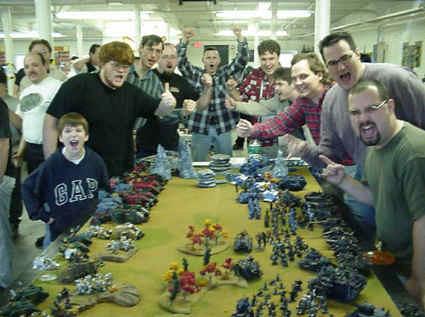 “Come on over, come on over ba-baaay” They all are singing.
“Come on over, come on over ba-baaay” They all are singing.
Now before I get too far into this article, let me say that I have been playing Magic: The Gathering on-and-off since around 1997 and still play casually to this day. I have been playing it longer than I have played 40k and I love both of them in different ways. 40k is by far my favorite of the two, but Magic will always have a special place in my heart and was a huge part of my childhood. When I use terms like “better”, it obviously depends on what you’re looking for in a game/hobby. Some things that are “better” about 40k in my eyes may not matter at all to other game players. But here’s what I have to say having played them both:
40k Is Just List-Building? Magic is Even More So
If you think list-building wins and loses games in 40k then it definitely does in Magic. We often hear complaints on the internet about the Power Curve and the Meta, where lists are so well tuned in one direction that a very different list can sometimes take it down easily. People complain that you should just compare army lists and it would be clear who wins, without even playing because it only matters how they stack up against each other. But we’re talking about a game where you still have deployment choices, reserve choices, terrain to either use or get around, and 360 degree movement. Don’t want to get your shooty units in combat? Keep them away from it! So in other words, even if you are poorly equipped to handle your opponent, there is a multitude of ways that you can still stay in the game and maybe even win.
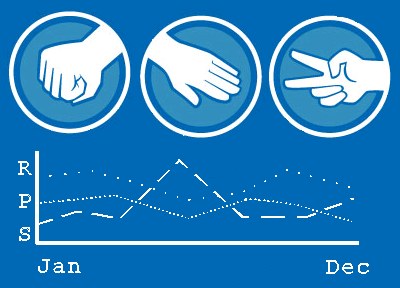 Honestly I think both games could use more hand signals though. Hand signals are fun.
Honestly I think both games could use more hand signals though. Hand signals are fun.
Magic on the other hand, is purely list building in comparison, because of the lack of “lateral” choices. Your only choices you have for each creature is to either attack, use an ability (if it has one), or block. There are no lateral choices like taking cover, staying out of a unit’s range, jinking, going to ground, having a character join a unit to buff it, etc. I suppose you could say that Instants or Enchantments are your version of lateral options, but that depends on your drawing them, and then you only use them once (usually).
When someone attacks with a creature, and it’s an 8/8 and the other person only has a 2/2 to defend it, there is an automatic outcome for this. Barring an Instant being played, there is zero chance that a regular old 2/2 creature is going to survive combat or kill an 8/8. Whereas in 40k, any Bloodthirster could whiff all of his hits against a Guardsmen; it may not be likely but it is possible. I have two Imperial Guard Sentinels with battle honors on their hulls for surviving for 2 full game turns in close combat with a Daemon Prince (the rest of that game).
They Both Use Random Mechanics, But One Does It Better
Obviously to all of you, Warhammer’s randomness comes from its use of dice. Outside of special rules like Twin-Linking, you have no control over how you roll, but you can hedge your bets and be sure to position smartly among other things. While we have all had games where our dice hated us and screwed our game for us, the real job of the dice is to level the playing field. On a bad luck dice day, the most ignorant net-list someone brings could still fail. It could be argued that if your dice were really on fire, the worst player could take just about anybody. While we love to complain about our dice, they are what make our game more even among different lists and skill levels. Like in my Bloodthirster example above, if you see a terrifying list across the table from you, at least you can hope for his dice to be crappy!
 The Great Equalizers. Look at them being smug with their power.
The Great Equalizers. Look at them being smug with their power.
In Magic, the combat isn’t random at all. A higher number beats a smaller number every time without question. It takes special rules or something else interfering to change that fact. The randomness in Magic comes from the Drawing Phase, because unless you are a cheater who fixed his deck, you won’t know what card is coming up next. That is a fun way to play a game, never sure what is coming up next, but it makes you more reactionary in your tactics and makes you plan less. Of course you can design a deck based around searching through your deck and getting certain cards when you want them, but then those cards allowing you to do that are taking up space in your deck that could be used for cards that provide more choices or offer more punch. The randomness in this game is your options turns by turn, not the outcome of your options like 40k. If find this to be much less fulfilling as a game mechanic than being able to make decisions that have a certain chance of succeeding and then seeing how they did by rolling.
Wargaming is a Hobby and a Game
I also think that wargaming is unique in the fact that it practically becomes a lifestyle. We spend so much time assembling, customizing, and painting our models that it becomes extremely personal and rewarding for us. There are huge portions of our demographic that only hobby and never play the game. That is how rewarding it can be for people. It’s relaxing, allows you to space out and have “quiet time” and escape from regular life. This is a completely alien thing to people who play card games exclusively. They don’t do anything to their cards except collect them and sort them.
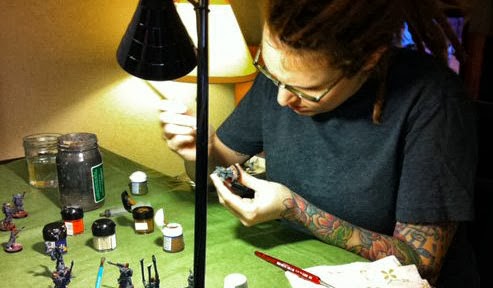 Looks boring? Psh. This is how she escapes the crippling burden of life for an hour a day.
Looks boring? Psh. This is how she escapes the crippling burden of life for an hour a day.
I suppose that you could say the “hunt” for cards and collectable nature of the game is Magic players’ pastime, but to me that seems much less fulfilling than literally creating your own army to play with. That being said, many people lives and living spaces are probably better suited for collecting cards versus piles of miniatures. That’s why it is the most popular card game on the planet.
In the end, everyone is different and has a different view on what is “fun” or “better”. The important thing for us to do is find something that makes us happy and go for it (just stay within the legal limits). I still love Magic, but I have definitely found a home in miniature wargaming and my wife can testify that it has infiltrated every facet of my life. I think in a good way.
Do you agree that wargaming is much more challenging and fulfilling?
Want to witness my slow descent into madness first-hand? Check out my blog at www.diceforthedicegod.com


